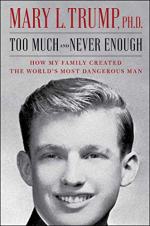|
This section contains 549 words (approx. 2 pages at 400 words per page) |

|
Too Much and Never Enough Summary & Study Guide Description
Too Much and Never Enough Summary & Study Guide includes comprehensive information and analysis to help you understand the book. This study guide contains the following sections:
This detailed literature summary also contains Topics for Discussion on Too Much and Never Enough by Mary L. Trump Ph.D..
The following version of this book was used to create the guide: Trump, Mary L. Too Much and Never Enough. Simon and Schuster, 2020.
The book takes the form of a chronological biography; while Donald Trump is the focal point of Mary L. Trump’s recollections, the work is differentiated from other works focused on the Trump family for the significant attention devoted to other individuals in the family as a way to shed light on their mutual dynamics and financial dealings.
Mary Trump describes the character of Fred Trump Sr., the patriarch of the family, and attempts to analyze how his treatment of his children has had a lasting impact on them. Mary diagnoses Fred Sr. as a high-functioning sociopath who sought to use those around him for his benefit as well as pitting his children against each other through the use of blatant favoritism.
Donald, while observing his brother Fred Jr. being criticized over perceived shortfalls, would adopt his father’s nature and push himself to avoid displays of sadness, weakness or kindness. Mary states Fred's influence ensured that Donald would have limited access to his range of emotions, a problem which she claims has followed him to the presidency. Donald’s mother, Mary, is described as physically and mentally challenged during the children's formative years as a result of illness. Later in life, Mary Trump would reveal to her granddaughter that she was relieved when Donald was sent to military school, as he had become belligerent and disobedient towards her, and Fred Sr. had no interest in disciplining Donald for his misdeeds.
The author chronicles the early career of Donald Trump. She observes that Fred Sr. was happy to have Donald assume massive responsibility within the family business at a young age to begin building the foundation of his wealth. Meanwhile, Freddy is unfairly blamed for failures of the business and leave in order to pursue a career as a commercial pilot instead. He suffers continued denigration of his chosen path, a contributing factor to his beginning alcohol abuse. His marriage and career both fall by the wayside and dissolve. Freddy eventually died due to a heart attack while isolated from his family.
Mary L. Trump continues to detail how Donald struggled to operate his businesses in the absence of his father’s guiding hand. He kept up appearances, however, as his wealth grew and his associates were ever more unwilling to tear down the façade of success. Mary also focuses on how the family turned on her after Fred Sr.'s death, including cutting off the health insurance of her brother and her, resulting in precarious conditions for her brother's child. She eventually learned the true value of her family's wealth by acting as an anonymous source in the Pulitzer Prize-winning New York Times investigation.
In the final chapters of the non-fiction work, the author provides her view of the period when Donald Trump successfully won his campaign for the US presidency. Mary again draws on her training as a psychologist to claim that her grandfather Fred Sr. initiated a direct line to more power actors, all enabling Donald's worst instincts to be stoked and empowered. She does not have hope for the future of the United States if President Trump is reelected.
Read more from the Study Guide
|
This section contains 549 words (approx. 2 pages at 400 words per page) |

|



